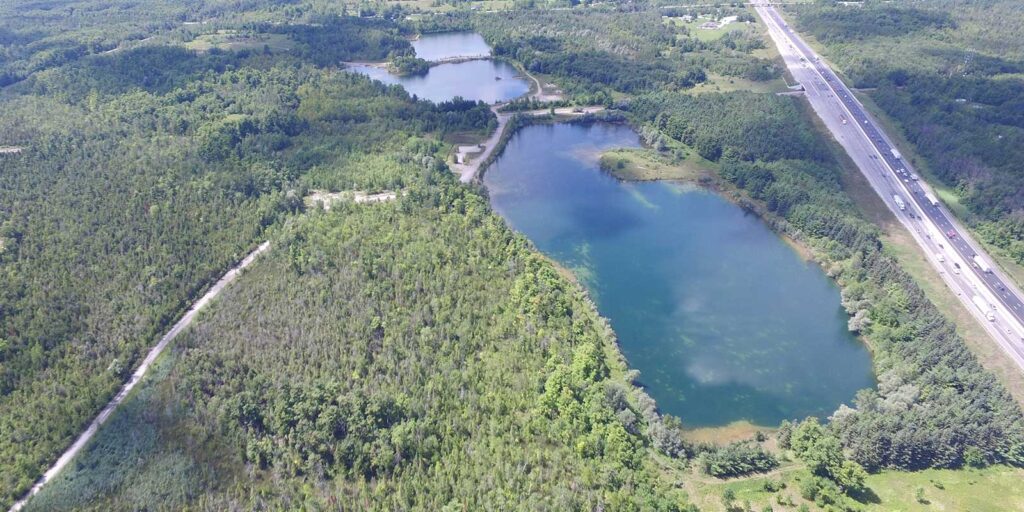New law makes good on Ontario government promise to end attack that forced city to sprawl
Toronto | Traditional territories of the Mississaugas of the Credit, the Anishinaabeg, the Haudenosaunee, and the Wendat – Ecojustice and Environmental Defence are celebrating the end of their case against the Ontario government for unilaterally imposing an expansion to Hamilton’s urban boundary.
Last week, the Ontario Legislature passed the Planning Statute Law Amendment Act (Bill 150), reversing the reckless and counterproductive changes to Hamilton settlement boundaries that were the subject of the litigation.
On November 4, 2022, the province announced it was changing Hamilton’s Official Plan by stripping out provisions designed to deliver desperately needed housing in existing neighbourhoods. Instead, the province forced a 2,200 hectare outward expansion of the city’s boundary into farmland and wild spaces.
This move caused palpable anger among city councillors, housing activists, planners, environmental advocates and residents about the provincial government’s imposition of further sprawl upon the City of Hamilton, which had decided to accommodate its future growth by densifying its existing neighbourhoods and settlement areas.
In January 2023, Environmental Defence, represented by Ecojustice, announced that it was seeking a judicial review of the Minister of Municipal Affairs and Housing’s imposed changes to Hamilton’s Official Plan.
These forced changes formed part of a wider attempt by the Ontario government to divert the province’s scarce construction capacity — desperately needed for compact infill housing — into the inefficient “greenfield” sprawl championed by a small, wealthy and politically influential subset of the development industry. That suite of changes, which also included the removal of key parts of the Greenbelt, resulted in the resignation of two government ministers and several political staff, an official rebuke from the province’s Auditor General and Integrity and Privacy Commissioner and an ongoing criminal investigation by the RCMP.
While the Greenbelt removals were also reversed last week, other aspects, like the proposed Highway 413 scheme, the gutting of wetland protections and the proposed dismantling of land-efficiency rules altogether, have yet to be officially abandoned.
Freedom of Information requests filed by Ecojustice on behalf of Environmental Defence showed that it was partisan Minister’s Office staff — not civil service experts — who directed changes to municipal Official Plans in ways that favoured select rural landlords and sprawl developers.
In October 2023 — days before the government was forced to disclose documents to Ecojustice and Environmental Defence showing how developers were able to influence these decisions — the Ontario government announced that it was reversing its changes to the Official Plans of municipalities and forced expansion of urban boundaries across the province. Bill 150, which follows through on this announcement has now passed into law. In the weeks that followed, Hamilton City Council confirmed that it wanted to maintain its urban boundary.
In light of Ontario’s reversal, now enshrined in legislation, the case against Ontario is no longer required. Ecojustice, representing its client, Environmental Defence, is withdrawing the case.
Laura Bowman, Ecojustice lawyer, said:
“The proposed expansion of Hamilton’s urban area would have caused irreversible damage by allowing inefficient, costly, car-dependent sprawl in sensitive areas.
“There was never a realistic possibility that un-serviced development approvals, on the fringes of urban areas, could provide fast, affordable housing.”
“The Ontario government’s reversal, and the admission of Minister Calandra that the process was flawed, is a vindication of our client’s position that the forced expansion of Hamilton’s boundary was unreasonable.”
Phil Pothen, Land Use and Land Development Program Manager with Environmental Defence, said:
“The Legislature’s reversal of this government’s forced boundary expansion in Hamilton is a victory for the overwhelming majority of Hamilton residents, who united around a vision for the future that rejects NIMBYism and environmentally-destructive sprawl, and embraces the social and environmental benefits of density and change in existing neighborhoods.
“However, there’s still a long way for the government to go. Now that Ontarians, and Golden Horseshoe residents in particular, understand that more low-density sprawl means fewer and more expensive homes overall, the only viable path for this government is to reverse course on the rest of its approach to land use. That starts with cancelling the Highway 413 scheme, abandoning plans to repeal the Growth Plan for the Greater Golden Horseshoe and overhauling development rules so as to focus construction on existing build up areas and the most land-efficient and low-cost housing types.”
ENVIRONMENTAL DEFENCE (environmentaldefence.ca): Environmental Defence is a leading Canadian environmental advocacy organization that works with government, industry and individuals to defend clean water, a safe climate and healthy communities.
ECOJUSTICE uses the power of the law to defend nature, combat climate change, and fight for a healthy environment. Its strategic, public interest lawsuits and advocacy lead to precedent-setting court decisions and law and policy that deliver lasting solutions to Canada’s most urgent environmental problems. As Canada’s largest environmental law charity, Ecojustice operates offices in Vancouver, Calgary, Toronto, Ottawa, and Halifax.
– 30 –
For more information or to request an interview, please contact:
Carolyn Townend, Environmental Defence, media@environmentaldefence.ca
Sean O’Shea, Ecojustice, soshea@ecojustice.ca





